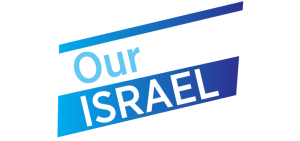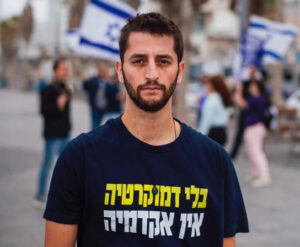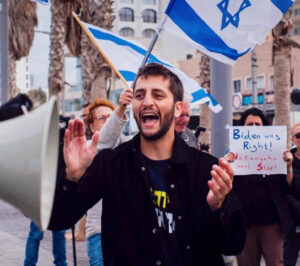
J Street’s “Our Israel” project spotlights the amazing Israelis who are committed to advancing democracy, justice, equality and peace – shared values enshrined in Israel’s Declaration of Independence.
Josh Drill, the International Spokesperson for Israel’s pro-democracy protest movement, has never been one to mince words – and he has a blunt message for some “pro-Israel” groups in the United States.
“If you’re not opposing what Netanyahu’s doing, then you’re on his side,” he tells J Street in an interview from Tel Aviv.
For months, hundreds of thousands of pro-democracy protesters have flooded streets across Israel to rally against what they see as a “judicial coup” being pursued by Prime Minister Benjamin Netanyahu and his coalition of nationalist, pro-settlement and ultra-Orthodox allies.
But New Jersey-born Drill and many others have been disappointed by the response from a number of establishment “pro-Israel” organizations in the United States.
“Organizations like Stand With Us and AIPAC have – from the beginning – stayed completely silent on the judicial overhaul. Saying that they’re not a political organization is a complete joke – it’s despicable,” Drill says. “They stayed silent, which is staying on Netanyahu’s side.”
His message has been echoed by several other prominent leaders of the pro-democracy protest movement – including several former Prime Ministerial aides – who recently penned a scathing op-ed in Israel’s Haaretz newspaper.
AIPAC is “effectively turning from a pro-Israel organization to one that promotes the anti-democratic overhaul and the de facto annexation of the West Bank, led by Netanyahu and aided by the most extreme, racist and violent elements of the Israeli far right,” the group wrote.
The return of Prime Minister Netanyahu – backed by an array of hard-right, ultra Orthodox, pro-settlement, extreme nationalist coalition allies – has presented a challenge to some American Jewish groups.
Most legacy organizations have been traditionally unwilling to speak out against the Israeli government, but it’s a position that increasingly puts them at odds with the pro-democracy movement in Israel and the overwhelming majority of Jewish Americans who support them.
“These organizations who seek to support the Israeli government no matter what the policies are are not in a healthy relationship,” Drill says. “In a healthy relationship, there’s criticism and there’s a need to improve. There’s the ability to hold a mirror in front of your spouse’s face.”
“These organizations are detrimental to Israel’s democracy,” he says.
Organizations like J Street – which has been rallying support for the pro-democracy movement in Congress – have pressed American groups to be more vocally supportive of the protesters. They’ve been sharply critical of groups, like AIPAC, that promote a version of “pro-Israel” advocacy that refuses to countenance criticism of Israeli policy – from “judicial reform” to settlements to annexation.
“Netanyahu can do whatever he wants, maybe disallowing the Arabs vote or other policies, and certain organizations would say, ‘What’s the difference? We don’t deal with internal politics,’” Drill says. “It’s a lie, it’s weakness. It’s a lack of integrity.”

Over the past few months, Drill has become the English-speaking face of Israel’s pro-democracy movement.
He streams protests and engages on social media in both English and Hebrew, amplifying the movement’s message and responding to the Netanyahu government’s actions in real time.
A recent Washington Post profile said his perfect English, growing list of press contacts and social media following have made him a valuable asset for the pro-democracy movement.
“We needed someone like Josh,” Nadav Galon, a Hebrew-language spokesman for the protest movement, told the Post.
Drill says it’s taken time, but the Jewish diaspora are coming to truly realize what’s at stake – and how important their voice and their support really is.
“It took a while to wake up the diaspora for them to truly understand that, yes, Israeli democracy as we know it is at risk,” he says. “The country that they love, the country that is a part of their identity, is now in danger of imploding.”
He says those who have spoken out and taken action are on the right side of history. “Your support, energy and resources are crucial in the continuation of our protests,” he tells American Jews.
Drill says it’s long-overdue for diaspora Jews to change the way they speak about Israel and to truly recognize the threat posed by the array of right wing, anti-democratic voices in Israel – from the settlement movement to the ultra-Orthodox to the hard-right nationalists.
“The way we spoke about Israel 10, 20 years ago, is no longer relevant,” he says. “If you’re speaking about Israel still as if it’s Disneyland, you’re stuck in the past and are very much part of the problem.”
That shift in thinking for diaspora Jews is a journey Drill knows well.
Between Jewish summer camp and day school, Drill had a very traditional American Jewish childhood. His mother is a conservative rabbi at a local Synagogue.
His upbringing instilled a passion for Israel, leading Drill to make aliyah after high school and eventually enlisting in the IDF.
At the start of his service, he was posted in northern Israel, responding to threats from Hezbollah. He was then posted to the divided city of Hebron deep in the West Bank.
Hebron – home to over 35,000 Palestinians, 600 Israeli settlers, and 2,000 Israeli soldiers defending a settlement planted in the middle of the old city – is a site of deep tension where the sharpest edges of military occupation are on full display.
It was there, Drill says, that “things got complicated.”
It was his first experience conducting no-knock raids on Palestinian homes. Breaking down doors, confiscating phones, ransacking rooms, separating men into one room, women and children into another.
“I found myself not as an IDF officer but as this police officer occupying Palestinians, entering Palestinians’ homes in the middle of the night, at least once a week, sometimes multiple times a week, sometimes a couple of days in a row,” he says.
He remembers hearing gunshots and running to the scene of a Palestinian stabbing attack. Seeing wounded soldiers near a fatally shot assailant, blood everywhere. The attacker, a 16-year-old girl.
“Being an occupying force every single day from the moment you wake up including when you’re sleeping – for five months – takes a toll on you,” he says.
Drill watched Jewish traditions co-opted and transformed by the settlement movement into shows of force and domination.
The annual commemoration of ‘Shabbat Chayei Sarah’ in Hebron – which marks the Book of Genesis story of Abraham purchasing a burial place for his wife, Sarah – has become a major attraction for extremist settlers, and a period of fear and violence for Palestinians.
The weekend is marked by a march, readings from the Torah and outbreaks to settler violence. Protected by thousands of troops, they smash windows, throw stones and attack Palestinians. “Some settlers come to give the Palestinians hell,” Drill says.
He remembers seeing two teenage settlers attack an elderly Palestinian man, shoving him to the ground where he hit his head and broke his glasses.
“I became aware of bigger challenges for the Jewish peoplehood,” he says, “for the Jewish soul.”

Today, Drill is one of the thousands of IDF veterans who have become a key part of the pro-democracy protest movement.
Israel’s veterans continue to train after their compulsory service, forming a large reserve contingent in the IDF. Now, tens of thousands of them are on strike. It’s a move which puts a “significant pressure point on the government,” Drill says.
Netanyahu has attacked striking reservists, accusing them of putting politics before country. Drill says that it’s Netanyahu who’s putting himself before the country he is sworn to serve.
“Enlisting to the IDF and our reserve duty was part of a social contract,” he tells J Street. “We agreed to serve Israel and we agreed to serve our people. We did not agree to serve a dictator.”
Netanyahu, who’s hold on power is contingent on support from a range of far-right allies, will do and say anything to protect himself, Drill says. The Prime Minister is also facing numerous corruption charges, and seeking to use his position to evade accountability.
“Netanyahu will lie to the public. He will deceptively manipulate large groups of people for his own game,” Drill says. “At every single point, he will say what he needs to say to get what he needs to get.”
Drill says there’s a deep connection between the ways in which Netanyahu and his allies are threatening Israel’s democracy within the Green Line, and the ways in which they’re threatening its democracy with settlements and annexation beyond them.
Indeed, settlement movement advocates have said openly that curtailing the powers of Israel’s judiciary is a vital step toward pursuing more settlements, more demolitions and ultimately total annexation of the West Bank.
Within the protest movement, there are varying levels of comfort in talking about the occupation, but Drill says it’s vital that the fight to preserve Israel’s democratic future not stop at the country’s borders.
“As someone who served in Hebron, I understand the cost and the implications of the occupation. I speak up about occupation,” he says. “I also understand that it is possible that right now, the main messaging needs to be against the judicial overhaul to stop the further backsliding of democracy and to try to keep this protest movement as mainstream as possible. Because in the end, we need numbers, while not ignoring occupation.”
Between New Jersey, the occupied West Bank, and the streets of Tel Aviv, Drill says his relationship with Israel has changed. But he says that throughout that time, it’s been his love for Israel that’s driven him to strengthen it, and to protect its future. He wants his fellow American Jews to do the same.
“In this critical and historic time, stand on the correct side of history,” he says. “Stand with the millions of Israeli protesters who are opposing the judicial overhaul and fighting for Israeli democracy.”